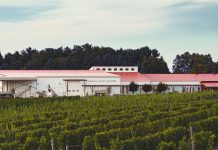
2023 is a special year for the team at Black Star Farms on the Leelanau Peninsula. It marks 25 years since the winery’s founding — and, managing owner Sherri Campbell Fenton and head winemaker Lee Lutes say, 25 years of progress and growth.
In 1998, founders Kerm Campbell and Don Coe, along with Lutes, came together to form Black Star Farms on a 120-acre estate in Suttons Bay. A quarter-century later, Black Star Farms includes a tasting room, production facility, 10-room inn, and dining options on the now-160-acre property, as well as a satellite tasting room on the Old Mission Peninsula.
Campbell Fenton and Lutes now head the business, and they’ve planned a host of events and special offerings this year to celebrate the milestone, including the release of a blanc de noir set to hit the tasting rooms later this spring. (Find the full list of events at blackstarfarms.com/25th-anniversary-celebrations.)
Here, they tell Michigan Wine Country what makes this anniversary special and what’s in store for the winery this year and into the future.
Editor’s note: This interview has been edited for length and clarity.
Michigan Wine Country: Overall, how does it feel to be celebrating 25 years?
Sherri Campbell Fenton: It’s very exciting to have reached this milestone. We’ve come a long way. We’ve grown so much. We’ve developed so many friends and almost lifelong — since it’s 25 years — employees.
Lee Lutes: How does it feel? In general terms, it feels great. Twenty-five years seems like a long time, especially when you’re younger. As you get older — and I started the winery, so I’ve been here since day one — it seems like time has just flown by. Winemakers are often sort of dated by the number of vintages they have under their belt, and I am celebrating my 31st vintage this year, so I’ve been around awhile. … It’s fun to be reflecting back over the years and also to be getting to the point where there’s enough experience and institutional knowledge, where we’ve been doing this long enough and our staff has been around and with us long enough, that we are pretty good at handling most if not all situations.
MWC: What are you most proud of that the winery has accomplished in the last 25 years?
LL: It’s hard to say there’s one thing. I’m proud of the recognition that we have helped bring to this region. I am proud of the wines that we have made literally from the very first vintage up until today. I’m proud of the people that have been part of our operations over the years and that are still with us. I’m proud of the brandy products that we’ve been making, the fruit brandies, and the way some of those are starting to catch on in the marketplace with the interest in craft distillation more and more. I’m proud of the land that we have helped to protect through conservation movements and basically agricultural land preservation. I’m proud of the fact that more people around the country and around the world know of Michigan as a wine-producing state. … So I’m proud of a number of things.

SCF: The [renown] that Black Star Farms has gained, not only throughout Michigan but throughout the country and even some [renown] internationally, has been just incredible. In addition to that, the awards that our inn continues to win and our event team continues to win really showcase how we are truly a premier destination for wine and winery experiences in northern Michigan.
MWC: What have been the greatest challenges for the winery over the past 25 years?
SCF: When we’re talking about wine, definitely it would be climate issues that have thrown a wrench into our growing season and harvest season during certain years. Most recently, across the entire property of all of our hospitality programs, the staffing issue is probably one of the most challenging things that we’ve had to deal with in a while.
LL: Well, all the things that I mentioned to you that I’m proud of, those things have at times been challenges. One of the biggest challenges in any business is the ability to adapt, and those challenges come up at times — they come up in economic downturns [and] they come up during difficult vintages — but we’ve always been a business that has worked hard to overcome challenges. Certainly, the whole COVID pandemic was a major challenge for all of us, but we found a way to push through that and survive. …
And the challenges, they can be numerous; they can be ever present. It can be weather. It can be labor. It can be regulatory. They’re almost with us daily, weekly, monthly as well, but we really work hard to be adaptive and push through it.
MWC: Black Star Farms has a variety of events planned this year to celebrate the anniversary. What are you most looking forward to?
SCF: We decided that instead of having just one celebration, why not celebrate all year long? So during this time, we’re taking a little bit of time to reflect back in gratitude towards certain people or events that we have hosted in the past, and so we’re bringing those back, including bringing back some people. But mostly we’re just really excited to showcase where we are and where we’re going into the future.
MWC: What are some examples of events that you’re bringing back?
SCF: One event that’s coming back is going to be our Great Lakes fish boils. They stopped actually during COVID because it was a group gathering event, but prior to that, we had held them, and they were very popular events. They were started by one of our original founding members, Don Coe, so we are bringing Don back to host the fish boil because it was one of his babies. We’re doing another thing where we’re doing a vertical tasting and we’re highlighting two of our most prominent varieties, Pinot Noir and Riesling, which we have grown and harvested since day one of Black Star Farms.

MWC: Black Star Farms plans to release a 25th anniversary blanc de noir later this year. Could you tell me a little about that?
SCF: We have been planning this for five years as a very special release. … It will be one of our premier sparkling wines, and we’re looking forward to that being one of our … wines that we’re putting the spotlight on as part of our celebration.
LL: It’s a wine that we made in the vintage of 2019, so we had to plan ahead, knowing that we wanted a special wine in a year like this. It’s made from the Pinot Noir that is grown at our estate vineyard, so that also makes it unique. We don’t typically make sparkling wine from that fruit; it’s typically made into red wine. But the 2019 vintage was a cooler vintage, and it was somewhat ideal for making quality sparkling wines, and so we just thought that this might be a unique opportunity to create something special this year with true méthode Champenoise, or traditional method, sparkling wines.
It’s a brut-style sparkling wine. It’s dry. It’s meant to be a serious wine. It was aging in the bottle — they call that en tirage — for a period of about two and a half years, almost three years. So it’s got a lot of those characteristics that people who like serious sparkling wines like, where it’s not quite as fruity, it tends to be a little more toasty and yeasty on the palate, and kind of bright. It’s definitely a pretty wine. Very limited — we didn’t make very much of it. … This is a one-time wine, at least for now, so once it’s gone, it’s gone.
MWC: Aside from the special events and the blanc de noir, are there any changes planned for this year?
SCF: We are coming out with a brand-new, rebranded, redesigned, full new menu for our café that is on our Suttons Bay property, so we will be excited to be announcing that in the coming weeks and look forward to inviting guests to come experience an all-new café experience at Black Star Farms.
MWC: Lastly, what are you looking forward to in the next 25 years and beyond?
SCF: Greater [acclaim for] our wines and the wines from the Traverse Wine Coast region, [acclaim] that could be recognized across the country as well as internationally. We are becoming a more well-known wine region, and that’s one of the most interesting goals for us that will uplift all of the wineries in the region and all of the events that they offer.
LL: What I’m looking forward to is ongoing and further development of this region as a serious wine region. The growth of the area, the recognition that the area in general brings in, is really pretty unique anywhere in the county. Our tourism influx has been growing exponentially over the years, and it’s a dynamic [and] unique place, and I’m looking forward to seeing the way that kind of recognition and interest continues. I think the [prospect] for Traverse City and the whole northwest of Michigan is nothing but positive, and we’ll see greater and further growth and greater and further recognition [for] both the culinary inputs that are here and also of course the wine culture that’s here.
MWC: Anything else you’d like to mention?
LL: Being a part of the industry up here, you can never be recognized as a single stand-alone entity. You’re always part of a bigger industry, a bigger palette. I’ve been proud to see the way the wineries have worked together. … I’m also proud of our part in that. We’ve at times taken the role of being a leader in some of those things, and at times, we’ve taken the role of just supporting leadership that’s being directed by somebody else. So we’re very much proud to be a part of this industry and to be a part of this region.













Facebook Comments